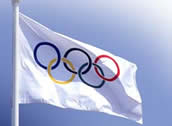|
 In June 1894 the modern Olympic Movement was founded by
Pierre de Fredy, the Baron de Coubertin. In June 1894 the modern Olympic Movement was founded by
Pierre de Fredy, the Baron de Coubertin.
He proposed a revival of the Olympic Games of classical
times. A group of delegates was formed and Athens was decided
to be the venue of the first Olympic Games of modern times,
in 1896.
Olympism
Coubertin was not only the driving force in organising the
Games, he also created a philosophy to accompany them - called
Olympism. His main inspiration was drawn from the ancient
Olympic games and he strongly believed in the ideals that
sport possessed the power to benefit humankind and encourage
peace among the nations of the world. He established this
in the Olympic Charter.
Organisational Structure
The Olympic Movement has a hierarchical structure, at its
head the International Olympic Committee (IOC). Below this
are the National Olympic Committees (NOCs), International
Federations (IFs) and National Governing Bodies (NGBs).
Eligibility
The only cirteria that the IOC imposes is that the competitor
must be a citizen of the country they represent. The other
committees mentioned above can add their own critera to
this, e.g. age limits or elegibility of professionals.
Selection Procedure
It is the NOCs responsibility to choose the Olympic team
for their nation. This is usually done by performing national
qualification competition or by choosing athletes on the
basis of their previous performances. The selection procedure
is typically decided by each sport's IF.
|


